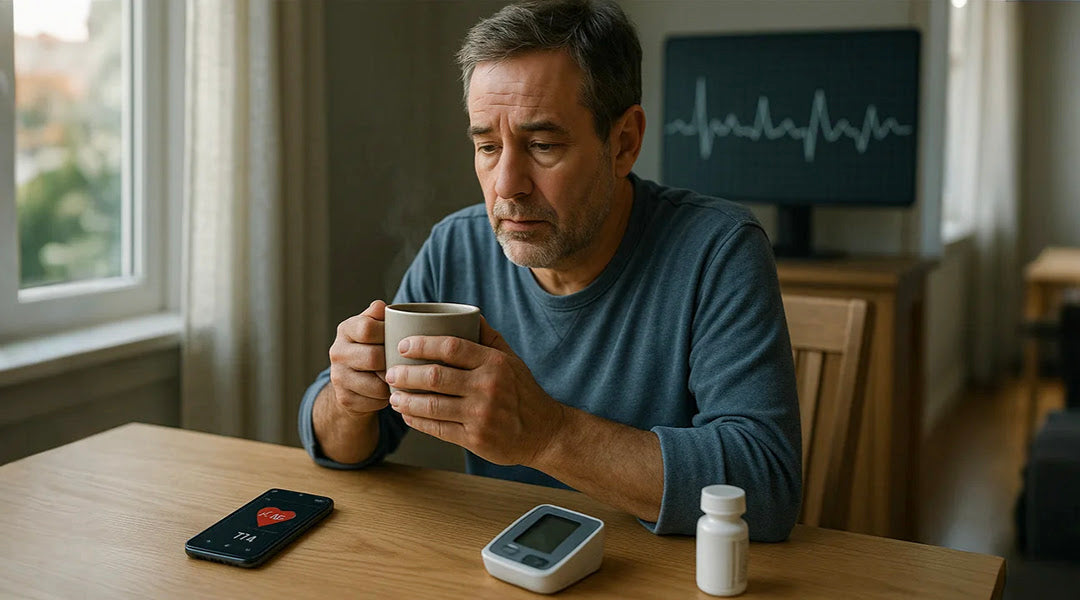
Should You Drink Coffee If You Have Atrial Fibrillation? What Science Really Say
Short Answer
Moderate coffee consumption (1-3 cups daily) doesn't appear to increase atrial fibrillation risk for most people. Several large studies show no link or even a slight protective effect. Individual reactions vary, especially with high caffeine intake or energy drinks. If coffee triggers your AFib symptoms, then you can consider limiting your intake and consult your doctor about your specific situation.
Key Takeaways
- Studies show moderate coffee intake doesn't raise AFib risk.
- Energy drinks may increase arrhythmia risk in sensitive individuals.
- Decaf coffee is generally safe due to minimal caffeine.
- Personal response to caffeine varies — listen to your body.
- Always consult your doctor about caffeine and heart health.
Imagine reaching for your morning cup of coffee, only to wonder if that comforting ritual might trigger your irregular heartbeat. For the millions of Americans living with atrial fibrillation, this concern is very real. Many cardiologists once routinely advised AFib patients to avoid caffeine entirely – but new research suggests this blanket recommendation might need reconsideration.
What Is Atrial Fibrillation and Why Does It Matter?
Atrial fibrillation (AFib) is the most common type of treated heart arrhythmia. It occurs when the upper chambers of the heart (atria) beat chaotically and irregularly. It can be out of sync with the lower chambers (ventricles). This disrupts normal blood flow and can lead to serious complications including blood clots, stroke, and heart failure.
AFib symptoms vary widely. Some people experience no symptoms at all, but others may feel:
- Irregular heartbeat or palpitations
- Chest pain
- Dizziness or lightheadedness
- Fatigue
- Shortness of breath
- Weakness
According to the CDC, approximately 12.1 million people in the US will have AFib in 2030. For this reason, it highlights its growing prevalence as our population ages.
How Does Caffeine Affect the Heart?

Caffeine is a central nervous system stimulant that can increase alertness and energy. It works by blocking adenosine receptors, which can impact heart rate and rhythm. For most people, moderate caffeine consumption temporarily raises blood pressure and heart rate.
But does this necessarily trigger arrhythmias? Not according to recent research. The evidence suggests caffeine's effects depend greatly on:
1. The amount consumed
2. Individual sensitivity
3. Pre-existing heart conditions
4. Whether you're a habitual coffee drinker
Regular coffee drinkers often develop tolerance to caffeine's cardiovascular effects. Your body adapts to consistent caffeine intake, potentially reducing sensitivity to its heart-stimulating properties.
What Does the Latest Research Say About Coffee and AFib?
The relationship between coffee and AFib has been extensively studied and that too with surprising results. A comprehensive study published in the European Journal of Preventive Cardiology noted that caffeine intake is actually associated with decreased risk of atrial fibrillation in some populations.
Dag S. Thelle, a researcher in this field, stated: "The findings of a neutral or potentially protecting effect seem consistent across a number of studies but it is far too early to draw firm conclusions."
The Physicians' Health Study, which followed nearly hundreds of men, found that moderate coffee consumption (1-3 cups daily) was associated with a reduced risk of AFib. The study concluded: "Our data suggest a lower risk of AF among men who reported coffee consumption of 1 to 3 cups/day."
This protective effect may seem counterintuitive. Researchers speculate that coffee's antioxidant properties might play a role, or that regular caffeine consumption could adjust how the heart responds to stimulants.
Is Decaffeinated Coffee a Safer Choice for AFib Patients?

For those concerned about caffeine but unwilling to give up their coffee routine, decaffeinated coffee presents an appealing alternative. Decaf retains most of coffee's flavor profile and antioxidant benefits with minimal caffeine content.
Decaffeination processes remove approximately 97% of caffeine from coffee beans. A typical 8-ounce cup of decaf contains just 2-5 mg of caffeine, compared to 80-100 mg in regular coffee.
The antioxidants in coffee, including chlorogenic acids, remain present in decaf and may offer heart health benefits. These compounds help reduce inflammation and oxidative stress, both factors in cardiovascular disease progression.
No large studies specifically examine decaf coffee and AFib risk, but its minimal caffeine content makes it unlikely to trigger arrhythmias in most people.
Do Energy Drinks and Other Caffeinated Beverages Increase AFib Risk?
Not all caffeine sources affect the heart equally. Energy drinks represent a particular concern for AFib patients.
These beverages often contain:
- High caffeine concentrations (sometimes 200-300 mg per can)
- Additional stimulants like guarana
- Taurine and other ingredients with potential cardiovascular effects
- High sugar content
Multiple case reports link energy drink consumption to AFib episodes, especially in young people. The combination of caffeine with other stimulants may create more significant heart rhythm disturbances than coffee alone.
A review published in the Journal of the American Heart Association found: "In very recent time an increase in caffeinated beverages, namely energy drinks, has been reported in young people and several arrhythmic complications have been observed."
How Can You Tell If Coffee Triggers Your AFib?

Despite reassuring population studies, individual responses to caffeine vary significantly. Some AFib patients notice clear connections between coffee consumption and symptom flares, a phenomenon known as caffeine sensitivity.
Signs that caffeine might trigger your AFib include:
- Heart palpitations beginning shortly after coffee consumption
- Increased frequency of AFib episodes on days with higher caffeine intake
- Symptoms improving during periods of caffeine abstinence
To identify personal triggers, consider keeping a detailed journal tracking:
1. Caffeine consumption (type, amount, time)
2. AFib symptoms (duration, severity, timing)
3. Other potential triggers (stress, sleep, alcohol, meals)
This information can help you and your doctor determine if caffeine restriction might benefit your specific case.
How Much Coffee Is Safe If You Have AFib?
For most AFib patients without clear caffeine sensitivity, moderate coffee consumption appears safe. Based on current research, guidelines suggest:
- 1-3 cups of coffee daily (200-300 mg caffeine) is generally considered moderate
- Spread consumption throughout the day rather than consuming large amounts at once
- Be consistent with daily intake to allow your body to adjust
Most experts note that sudden increases or decreases in caffeine consumption may be more problematic than consistent moderate intake.
When Should You Avoid Coffee with AFib?

Despite the generally reassuring research, certain situations warrant caffeine caution:
- After a new AFib diagnosis, until you understand your personal triggers
- During periods of poorly controlled symptoms or active AFib episodes
- When starting new heart medications that might interact with caffeine
- If your doctor specifically advises against it based on your medical history
- When combined with other AFib triggers like alcohol, poor sleep, or extreme stress
Mayo Clinic's comprehensive AFib guide notes that lifestyle triggers vary significantly between patients, emphasizing the importance of individualized recommendations.
Coffee, Caffeine & Atrial Fibrillation
|
Topic |
Key Insights |
|
Moderate Coffee Consumption |
1–2 cups daily is usually safe for AFib; some studies suggest slight protective effects. |
|
Decaf Coffee |
Minimal caffeine (2–5 mg per cup); unlikely to trigger arrhythmias; retains antioxidants. |
|
Energy Drinks |
High caffeine + stimulants can trigger AFib; multiple case reports link energy drinks to arrhythmias. |
|
Caffeine Sensitivity |
Varies individually; some people experience palpitations even with small amounts of caffeine. |
|
Caffeine & AFib Research |
Large studies (Framingham, Danish, Women’s Health) show no clear link between moderate coffee & AFib. |
How to Talk to Your Doctor About Coffee and AFib
Open communication with your healthcare provider is essential for managing AFib effectively. When discussing caffeine consumption, consider asking:
1. "Does my specific type of AFib make me more sensitive to caffeine?"
2. "Should I limit caffeine before/after medical procedures for my AFib?"
3. "Could my heart medications interact with caffeine?"
4. "What symptoms might indicate I should reduce my coffee intake?"
5. "Would wearing a heart monitor help determine if coffee affects my heart rhythm?"
Be honest about your actual consumption habits. Many patients under report caffeine intake and therefore limiting your doctor's ability to provide appropriate guidance.
The Bottom Line
Current research challenges the conventional wisdom that coffee and AFib don't mix. For most patients, moderate coffee consumption appears safe and may even offer some heart benefits through antioxidant activity.
The Mayo Clinic's comprehensive approach to AFib diagnosis and treatment emphasizes that management should be individualized based on specific symptoms, medical history, and lifestyle factors.
The most important takeaway? Listen to your body. If you notice clear connections between coffee and AFib symptoms, reducing intake may help. But if you enjoy coffee without apparent heart rhythm disturbances, current evidence suggests you can keep your daily cup or two.
Frequently Asked Questions (FAQs)
Can caffeine cause atrial fibrillation?
Research suggests caffeine doesn't cause AFib in most people. Population studies show moderate coffee consumption (1-3 cups daily) may actually have protective effects against developing AFib.
Is decaf coffee completely safe for AFib patients?
Decaf coffee contains minimal caffeine (2-5 mg per cup) and is generally considered safe for AFib patients. It retains coffee's antioxidant benefits without significant stimulant effects.
What drinks should I avoid if I have AFib?
Energy drinks pose the highest risk due to concentrated caffeine and additional stimulants. Some patients may need to limit all caffeinated beverages, including tea and soft drinks, based on individual sensitivity.
Does the way coffee is brewed affect heart health?
Yes. Unfiltered coffee (French press, Turkish, espresso) contains compounds called diterpenes that can raise cholesterol levels. Paper-filtered coffee removes most of these substances. For this reason, it makes it a heart-healthier choice.
About the Author
The Lifeboost Team combines coffee expertise with evidence-based health research to create trustworthy, accessible content. Our writers work with medical professionals to bring you accurate information about coffee and its effects on health conditions like atrial fibrillation.
Disclaimer: This article is for informational purposes only and does not replace professional medical advice. Always consult your healthcare provider about AFib and caffeine intake.
Check out Lifeboost Coffee Grata Medium Roast.
"Medical Disclaimer
This content is for informational and educational purposes only. It is not intended to provide medical advice or to take the place of such advice or treatment from a personal physician. All readers/viewers of this content are advised to consult their doctors or qualified health professionals regarding specific health questions. Neither Dr. Charles Livingston nor the publisher of this content takes responsibility for possible health consequences of any person or persons reading or following the information in this educational content. All viewers of this content, especially those taking prescription or over-the-counter medications, should consult their physicians before beginning any nutrition, supplement or lifestyle program."









